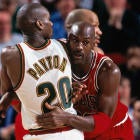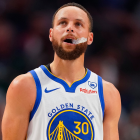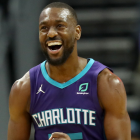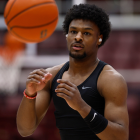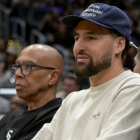Michael Jordan has rarely been one to give credit where it is due. If "The Last Dance" has made anything clear, it is that his results-driven brain isn't interested in appreciating those he vanquished en route to six championships. Jordan won. His opponents lost. He doesn't dwell on journeys, only a singular destination, and as long as he got there, he is perfectly willing to disregard those who attempted to get in his way. That includes, as of episode 8 of "The Last Dance," 1996 NBA Finals opponent Gary Payton.
"I had no problem with the Glove," Jordan said dismissively after Payton claimed to have changed the series with his incredible defense from Games 4-6. "I had other things on my mind."
Yes, it is true that 1995-96 was the first season that M.J. played without his father by his side, and yes, it is true that Game 6 of the 1996 NBA Finals was played on Father's Day, but Payton's handiwork was hardly confined to a single game. When the Seattle SuperSonics and Bulls met for the first time in the regular season, Payton held Jordan to 22 points on 6-of-19 shooting in a Sonics victory. In the three NBA Finals games in which Payton drew the primary Jordan assignment, His Airness averaged only 23.7 points per game on 36.7 percent shooting from the field. In Chicago's first 15 playoff games, Jordan averaged 32.1 points on 47.6 percent shooting.
Numbers don't lie. Jordan did, in fact, have a problem with the Glove. So how did Payton defend Jordan so effectively? Let's dive into the 1996 NBA Finals to find out.
Prologue: Why didn't Payton defend Jordan for the entire series?
To call Gary Payton the greatest defensive point guard in NBA history is almost an understatement. Pound-for-pound, he is one of the best defenders the NBA has seen at any position. He earned First-Team All-Defense honors nine years in a row. He won Defensive Player of the Year in 1996 despite the All-Defensive First Team being 60 percent Bulls (Jordan, Scottie Pippen and Dennis Rodman).
But during Seattle's run to the Finals, Payton tore a calf muscle and was playing at less than 100 percent. Key reserve and team leader Nate McMillan was injured as well, and Chicago had the NBA's best defense by far. After the Utah Jazz held the Sonics to only 89 points per game in the Western Conference finals, George Karl decided to prioritize offense. Payton wouldn't initially defend Jordan so as to save his energy for scoring. The results were disastrous.
Payton struggled offensively, averaging only 15 points on 40.4 percent shooting, but Jordan didn't. He roasted Seattle's other wings, proving far too big for Hersey Hawkins in the post, but too fast for the bigger Detlef Schrempf in averaging 31 points on 46 percent from the field. Chicago won the first three games of the series, so a desperate Karl pulled the trigger and moved Payton onto Jordan.
Games 4-6: Payton's masterpiece
"A lot of people backed down to Mike," Payton explained in "The Last Dance." "I didn't. I made it a point, I said 'just tire him out. Tire the f*** out of him. You've just gotta tire him out.' I just kept hitting him and banging him and hitting him and banging him, and it took a toll on Mike."
That principle governed Payton's entire defensive strategy. He sent that message of physicality on the very first play of Game 4.
This was, essentially, how Payton treated Jordan off of the ball on every play. The physicality with which he played would be unheard of in the modern game, and it wasn't just limited to chasing Jordan around. Whenever he got the ball facing the basket, Payton pulled out every trick in the book. He swiped relentlessly, hand-checked and steered Jordan into traffic without giving him an inch of breathing room.
Playing Jordan that closely served a number of purposes, but in his book, Furious George, Karl explained what he believed to be the biggest. It was a counter to one of Jordan's signature tics, his left jab-step.
"Pippen or Harper throws it to Jordan on the wing," Karl began. "He catches and immediately tucks it, both hands on the ball, head up, elbows out. Not unusual, this is the 'triple threat' position you learn in junior high. You can shoot, pass or dribble from this semi-crouch. Then Michael "wipes" the ball, swinging it low and back and forth in response to the defender's digs at it. Again, everyone does this. Then, almost every time, Michael jab-steps with his left foot. This little fake was the golfer's waggle, the thing he had to do before he could shoot or attack the rim."
Payton interrupted every step of that sequence. Swiping at the ball made it difficult for Jordan to swing it low. The lack of physical space prevented jab-stepping. It threw Jordan completely out of his rhythm, forcing him to rush shots even when he managed to sneak away from Payton.
Playing Jordan this physically is a death sentence for normal defenders. He was so dangerous as a driver that typical opponents played off of him as a sign of respect. Case in point, just look at how fellow Sonic David Wingate played him during a brief rest for Payton in Game 4.
Payton was just so fast and so strong for his size that he could get away with things that normal defenders couldn't. This allowed Seattle to get more aggressive in denying Jordan the ball. Nowhere was his aggressive style and physical excellence more apparent than in his ability to front Jordan in the post.
Once Jordan has backed you down one-on-one, he's already beaten you. No perimeter player has ever scored as easily from the post, so the Sonics committed Payton to denying him those opportunities. As a safety valve, they threw doubles at Jordan only when he did manage to get the ball in the post.
There is ultimately no stopping a player of Jordan's caliber. He found ways to counter Payton's aggressive defense. Quick, decisive cuts to the basket are the standard defense against post-fronting, so once the Bulls caught on, they made a point to look for lob passes that would generate layups.
Jordan has a counter for just about everything, and he had to use every one of them to counter Payton's relentless defense. Even then, it wasn't his offense that ultimately won him this series. Seattle went cold in Game 6, scoring only 75 points on 5-of-24 shooting from behind the arc. Chicago needed only 87 points to win the championship. Had the Sonics hit their shots in Game 6, or had Karl allowed Payton to defend Jordan from the start, this series could have gone entirely differently. Even in light of what actually happened, it stands out as the single-best defensive stretch any player managed against Jordan.
The aftermath: Where Payton stacks up against other 'Jordan stoppers'
The "Bad Boys" Pistons may be Jordan's greatest rival historically, and he himself has called Joe Dumars the toughest defender he has ever faced. Statistically speaking, though, Detroit never contained him as well in the playoffs as Payton did.
| Jordan postseason stats | PPG | FG% |
|---|---|---|
vs. 1988 Pistons | 27.4 | 49.1 |
vs. 1989 Pistons | 29.7 | 46 |
vs. 1990 Pistons | 32.1 | 46.7 |
vs. 1996 Sonics (Games 4-6) | 23.7 | 36.7 |
Beyond the Pistons, there just isn't anyone with a consistent track record of containing Jordan. Journeyman guard Gerald Wilkins was once nicknamed "the Jordan stopper," yet in 39 career matchups, Jordan averaged 30.8 points on 50.8 shooting from the field. A number of players have had similar anecdotal success as part of greater team systems, such as John Starks and Vernon Maxwell, but neither the stats nor the scoreboard ultimately lands in their favor.
Nobody can boast a stretch against Jordan at his peak nearly as successful as Payton. No matter what circumstances Jordan claims hampered him in the 1996 Finals, there is no arguing that Payton caused him problems.









